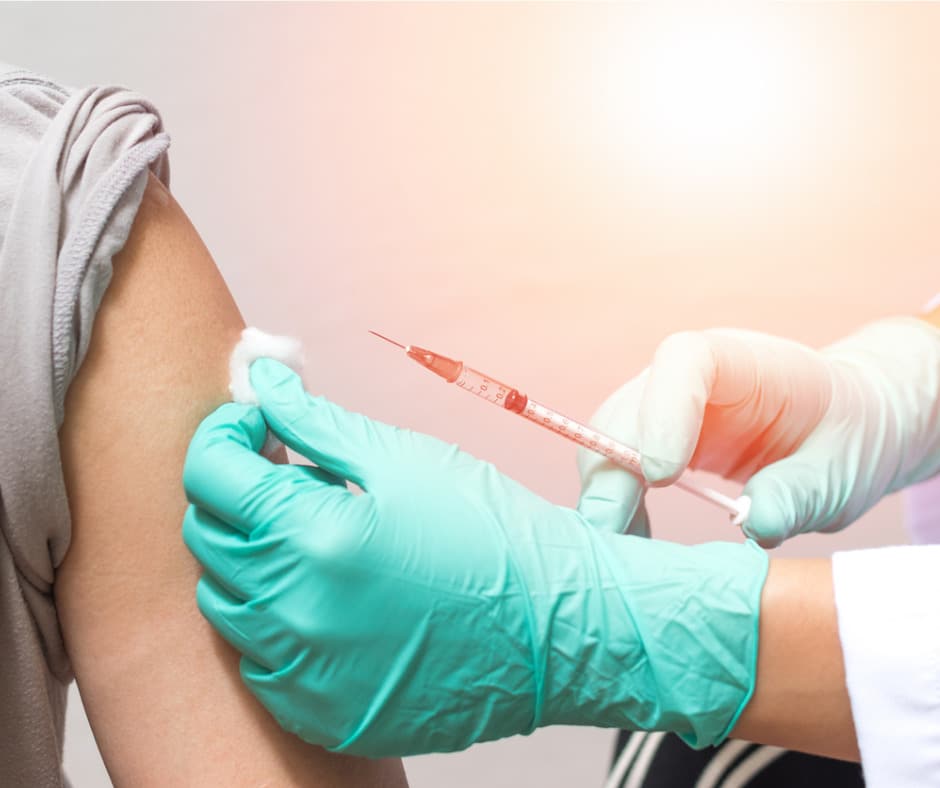Let’s face it…
Coronavirus vaccines were not created under ideal conditions.
Labs put them together in record time. They were produced far faster than any other vaccines in history.[1]
They were tested in relatively small clinical trials that lasted only a few months. Previous vaccines were tested for years, some for as long as a decade.
The vaccines were so created and tested so quickly, that the FDA didn’t have the data to approve them using its usual procedures. Instead, it did a fast-track review. Then it approved the shots using something called an Emergency Use Authorization. It’s allows for faster approval when there is a medical emergency.[2]
The vaccines appeared safe in clinical trials. But because they were so short, there was no way to know exactly what would happen when the shots were given to millions of people.
The early results did not inspire confidence.
Almost immediately, an unexpected side effect appeared. A few people suffered severe allergic reactions to the shots. Nobody died, but the fact that this adverse reaction came without warning and was not discovered in testing, was disturbing.[3]
We’re Starting to Get a Better Read on Vaccine Side Effects
It has now been more than two months since the Pfizer and Moderna vaccines first started going into the arms of Americans. Nearly 45 million people in the U.S. have received at least one dose. And we are starting to get a better read on the side effects.[4] [5] [6]
The U.S. Centers for Disease Control and Prevention recently issued comprehensive data on vaccine adverse events in its Morbidity and Mortality Weekly Report.
The news was mostly good. It found that the severe allergic reactions, known as anaphylaxis, that were so alarming at the outset of public vaccination are rare. They occurred in 4.5 out of every million doses administered.
By comparison, the flu vaccine causes 1.4 cases of anaphylaxis per million, the pneumonia vaccine 2.5 per million, and the shingles vaccine 9.6 per million.[7]
There were 46 reports of severe allergic reaction from the Pfizer vaccine and 16 from Moderna shots.
Here’s what else the report disclosed:
- Besides anaphylaxis, no other serious side effects have been found.
- Roughly half the people getting shots experience minor side effects.
- The most common side effect is a headache (22%), followed by fatigue (16.5%), and dizziness (16.5%). Some people also suffered chills and nausea. The symptoms are most likely to occur after the second shot. They typically go away after a day or two.
- 113 people died shortly after getting vaccinated. But there is no evidence that suggests the vaccine caused the deaths, according the CDC. Most of the deaths occurred in nursing homes. The CDC points to the fact that the death rate among long-term care facility residents who got vaccinated is no higher than those who didn’t.
- There’s no evidence that the vaccines prevent pregnancy, contrary to a widely circulating myth. Hundreds of women have reported that they got pregnant after receiving the shots, the CDC said. Some 10,000 women were pregnant when they were vaccinated. No pregnancy complications have been reported as a result of the vaccines.[8]
The bottom line? Short-term vaccine side effects are common but minor. Anaphylaxis is the only serious side short-term side effect. But it is rare.
As for the long-term, there’s still no way to know.
The vaccines were tested for just a few months. There’s no way tell if adverse effects will appear many months, or even years, after getting the shots.
But that is starting to look less likely. It has now been more than six months since the earliest trial subjects received the vaccines. There have been no long-term side effects reported in these early trial participants.[9]
Dr. Gregory Poland is co-director of the Mayo Clinic’s Vaccine Research Group. He called the new side effect data “reassuring.”
Dr. Poland added: “Other than somebody who has an anaphylaxis reaction to a component of this vaccine, these shots are safe and they are effective.”[10]
If you’ve been wondering if you should get vaccinated because of uncertainty about side effects, you now have more information on which to base your decision.
Editor’s Note: Have you put on weight during the pandemic? You’re not alone. 76% of American adults have added unwanted pounds during the coronavirus crisis.
If you’re one of them, don’t go on a diet. Read our monthly journal Independent Healing to discover science-proven, more effective ways to lose weight. Unlike diets, you won’t go hungry and don’t have to give up your favorite foods. Go HERE to get all the details.
Related Articles
Coronavirus: Stop Worrying About Contaminated Surfaces
Pandemic Plane Travel May Be Safer Than You Think
This Is How You’re Likely to Catch Coronavirus
[1] https://www.medicalnewstoday.com/articles/how-did-we-develop-a-covid-19-vaccine-so-quickly
[2] https://www.fda.gov/vaccines-blood-biologics/vaccines/emergency-use-authorization-vaccines-explained#:~:text=An%20Emergency%20Use%20Authorization%20(,COVID%2D19%20pandemic.
[3] https://www.cdc.gov/mmwr/volumes/70/wr/mm7002e1.htmW
[4] https://www.washingtonpost.com/nation/2020/12/14/first-covid-vaccines-new-york/wh
[5] https://abcnews.go.com/US/us-administer-1st-doses-pfizer-coronavirus-vaccine/story?id=74703018
[6] https://www.washingtonpost.com/
[7] https://consumer.healthday.com/b-2-19-approved-u-s-covid-vaccines-are-safe-new-review-confirms-2650623525.html
[8] https://www.yahoo.com/lifestyle/no-evidence-covid-19-vaccine-causes-infertility-184044548.html
[9] https://www.pfizer.com/news/press-release/press-release-detail/pfizer-and-biontech-conclude-phase-3-study-covid-19-vaccine
[10] https://www.yahoo.com/lifestyle/covid-19-vaccines-cause-mostly-mild-side-effects-cdc-finds-223027833.html

